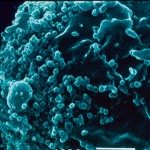Link to Pubmed [PMID] – 25131736
Vaccine 2014 Sep;32(43):5577-84
Innate mechanisms are critical for the development of the host immune responses to antigen. Particularly, early interaction between natural killer (NK) cells and dendritic cells (DC) greatly impacts the establishment of both innate and adaptive immune responses. In this study, using an autologous in vitro co-culture system we analyzed the NK cell response against MVAHIV-infected DC as well as the subsequent ability of these MVAHIV-primed NK cells to control HIV-1 infection in autologous DC. We found that NK cells responded early to MVAHIV- or MVAWT-infected DC in terms of degranulation and cytokine production. After a 4-day priming of NK cells by MVAHIV- or MVAWT-infected DC we observed an enhanced proliferation and modulation in the NK cell receptor repertoire expression. Interestingly, we found that MVAHIV-primed NK cells had a significant higher ability to control HIV-1 infection in autologous DC compared to MVAWT-primed NK cells; and this enhanced anti-HIV-1 activity appeared to be HIV-specific as MVAHIV-primed NK cells did not have a better ability to control other viral infections or respond against tumoral cells. Furthermore, we observed that NK cell receptors NKG2D and NKp46 modulate the priming of NK cells. This data provides evidence that in vitro NK cells can be primed by viral vector-infected DC, in the context of a NK/DC culture, to specifically target viral infected cells.



